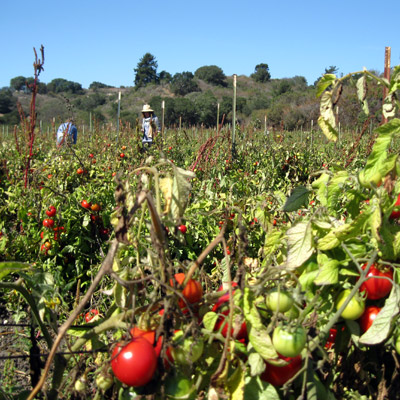Preserving the Local Foodshed
Brie Mazurek, CUESA Staff
October 21, 2011
 On a recent CUESA farm tour, a group of adventurers got a taste of an integrated local food system by visiting Happy Girl Kitchen in Pacific Grove and one of their partner farms, Live Earth Farm in Watsonville. The Field to Jar excursion began with a tour of the farm, where the group picked dry-farmed organic tomatoes. It culminated at Happy Girl, where they learned to pickle the harvest, Italian style. View the slideshow.
On a recent CUESA farm tour, a group of adventurers got a taste of an integrated local food system by visiting Happy Girl Kitchen in Pacific Grove and one of their partner farms, Live Earth Farm in Watsonville. The Field to Jar excursion began with a tour of the farm, where the group picked dry-farmed organic tomatoes. It culminated at Happy Girl, where they learned to pickle the harvest, Italian style. View the slideshow.
“We’re the only working cannery on Cannery Row,” says Happy Girl Kitchen co-owner Todd Champagne of their Pacific Grove production kitchen. While Cannery Row was originally home to Monterey Bay’s thriving sardine industry, Todd and his wife and partner Jordan, with their organic pickles, jams, and juices, are restoring the vital role that small canneries have played in supporting the local food system.
Back-the-landers at heart, the Champagnes bring firsthand knowledge of farming to their craft. Prior to founding Happy Girl, they worked at Happy Boy Farms, based near Watsonville, for four years. There, they experienced the seasonal ebb and flow of produce sales: in times of surplus, the market would become saturated, prices would drop, and gorgeous fruits and vegetables would wind up in the compost.
But in these cycles the Champagnes saw opportunity. “There was plenty of great produce, but there was a lack of commercial kitchen space,” says Todd. So they set up a makeshift pickle shack at the farm and started preserving the excess harvest. When they eventually decided to start a business of their own, they had already developed a roster of farms to call on through their relationships at Santa Cruz farmers markets.
“Working at Happy Boy enabled us to tap into our regional farms with insight that farmers appreciate, because we could help them through the surpluses,” says Todd. Now a state-licensed cannery (one of the smallest in the region), they’ve found their niche transforming small and mid-sized organic farms’ bumper crops into delicious pickles and preserves
 Cultivating Relationships
Cultivating Relationships
One of their earliest connections was Live Earth Farm, which the Champagnes knew from their market days. An 80-acre organic farm in Watsonville, Live Earth operates a year-round CSA (community-supported agriculture distribution network) for 800 families, as well as a nonprofit called the Discovery Program, which provides hands-on educational programs for underserved youth. “We really admired Live Earth’s community style,” says Todd.
Over the years, Happy Girl and Live Earth have developed what Jordan describes as a close “symbiotic partnership.” With more than 50 crops on their farm, Live Earth offers Happy Girl a diversity of produce at bulk discounts, from green beans and dry-farmed tomatoes to pears and quince. The farm also opens up their barn kitchen to Happy Girl’s canning and pickling workshops, where participants can learn to put food by in the setting where it was grown.
In turn, Happy Girl creates value-added products that add variety to the farm’s CSA boxes. The cannery preserves Live Earth’s produce at its peak, and in the cold winter months, when members are inundated with cabbage and kale, a jar of apricot jam or spicy pickled peppers brings the bright flavors of summer to the mix. Happy Girl also extends the CSA’s geographical reach beyond the Central Coast by making deliveries on their Bay Area route to the Ferry Plaza. (See the Live Earth website for pickup locations.)
Happy Girl now works with more than a dozen local farms, including Catalán Family Farm, Dirty Girl Produce, and Knoll Farms. Last year, Dirty Girl approached Happy Girl (yes, jokes have been made) to pack their dry-farmed tomatoes for market. Dirty Girl sold out of the jars immediately, so this season Happy Girl is packing 1,500 pounds of tomatoes for them every week.
“Happy Girl helps us with plan B,” says Dirty Girl farmer Joe Schirmer. “In order to have enough, you have to plan on having too much.” The Happy Girl partnership allows them to return their surplus to the market for their customers to enjoy throughout the off-season.

The Microcannery Renaissance
Last year, the Champagnes opened their production kitchen, breathing new life into a former food co-op space. The cannery serves multiple functions: café, retail store, classroom, and Live Earth CSA pick-up location. Happy Girl also connects local farms and eaters by making bulk purchases for their home canning club, called the Food Preservationists. Offering regular workshops and an open layout that places the production area in clear view, the kitchen is designed to demystify the process of food preservation for budding DIYers as well as consumers.
With their limited batches and focus on traditional foodcraft, the Champagnes call their operation a microcannery (“like a microbrewery but for fruits and vegetables”). They believe such businesses are an essential link in reconnecting local food chains.
“Let’s take a look at the history books and see how it was done,” Todd says. “That’s the logical pattern to return to—decentralized, regional farms. And each little foodshed has its commercial kitchen space that can accommodate the surplus of the local farms.” By nurturing new food preservationists and providing alternate avenues for local farms to share their harvests, Happy Girl is restoring a lost tradition, one jar at a time.
Happy Girl Kitchen is at the Ferry Plaza Farmers Market on Saturdays, from 8 am to 2 pm. They also have a kiosk inside the Ferry Building, which is open seven days a week.
Topics: Farmers, Food makers, Small business

 Cultivating Relationships
Cultivating Relationships